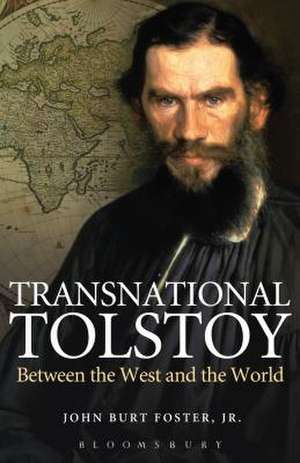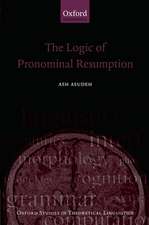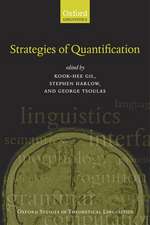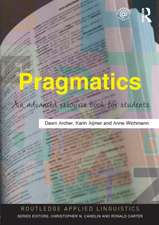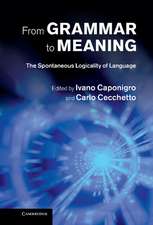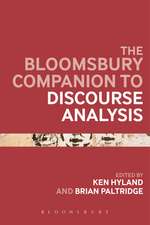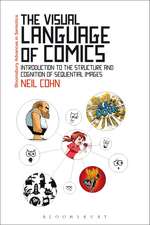Transnational Tolstoy: Between the West and the World
Autor John Burt Foster, Jr.en Limba Engleză Paperback – 14 aug 2013
Preț: 185.47 lei
Preț vechi: 241.15 lei
-23% Nou
Puncte Express: 278
Preț estimativ în valută:
35.49€ • 38.54$ • 29.81£
35.49€ • 38.54$ • 29.81£
Carte disponibilă
Livrare economică 01-15 aprilie
Preluare comenzi: 021 569.72.76
Specificații
ISBN-13: 9781441157706
ISBN-10: 1441157700
Pagini: 208
Dimensiuni: 138 x 216 x 20 mm
Greutate: 0.36 kg
Editura: Bloomsbury Publishing
Colecția Bloomsbury Academic
Locul publicării:New York, United States
ISBN-10: 1441157700
Pagini: 208
Dimensiuni: 138 x 216 x 20 mm
Greutate: 0.36 kg
Editura: Bloomsbury Publishing
Colecția Bloomsbury Academic
Locul publicării:New York, United States
Caracteristici
Connects Tolstoy's writings with the work of Stendhal, Flaubert, Goethe, Proust, Lampedusa, and Mahfouz
Notă biografică
John Burt Foster, Jr., is University Professor of English and Cultural Studies at George Mason University, USA. He is the author of Heirs to Dionysus: A Nietzschean Current in Literary Modernism (Princeton University Press, 1981) and Nabokov's Art Memory and European Modernism (Princeton University Press, 1993) and the editor, with Wayne J. Froman, of Dramas of Culture: Theory, History, Performance (Lexington Books, 2008). He is the past editor of The Comparatist and of Recherche littéraire / Literary Research, the journal of the International Comparative Literature Association.
Cuprins
Introduction: Transnational Tolstoy and the New ComparatismPart One: Facing West1. "Occidentalism" in Tolstoy and Dostoevsky: Culture Shock on European Visits2. Vengeance is Mine: Anna Karenina and Stendhal's Italy3. Napoleonic Anniversaries: War and Peace and Flaubert's Sentimental Education4. From Worldliness to World Literature: Tolstoy between Goethe and ProustPart Two: Outside the Soviet Canon5. Realism as Imagism: Tolstoy, Nabokov, and Modernist Fiction6. Toxic Nationalism: From Tolstoy and Stendhal to Malraux and Lampedusa7. Felt History: From Anna Karenina to Magical RealismPart Three: Into the World8. What is Art?, Hadji Murad, and World Literature9. Dialogues with Tolstoy: Premchand and Mahfouz10. "Show Me the Zulu Tolstoy": Who Owns War and Peace?11. Postcoloniality and Islamic Identity in Hadji MuradConclusion: Between the West and the WorldBibliographyIndex
Recenzii
Transnational Tolstoy is a welcome and groundbreaking addition to Tolstoy studies, and to the transnational reading of Russian literature generally . In this rewarding volume, John Burt Foster has updated and extended the exhausted genres of 'Tolstoy and the West' and 'Tolstoy and World Literature.' . Transnational Tolstoy provokes consideration . and plays an exemplary role in opening Tolstoy's complex position 'between the west and the world' to new and productive approaches.
Transnational Tolstoy is unlike any other current work on Tolstoi today. It provides a refreshing and thought-provoking look at one of the major figures of Russian literature and the dialogues he inspired and initiated around the globe.
Foster ... clearly has a gift for condensing his arguments into self-contained, well-expressed units.He also writes with a stylistic finesse and an apparent aversion to generating critical antipathy; his focus is always on saying things as well and persuasively as possible. Judging by his wide cultural knowledge, refined style, and pleasing attitude, he could have been a diplomat.
Foster's book is a laudable venture into a new critical method of reading great fiction transnationally ... [He] works with splendid erudition and ingenuity ... [to provide] a refreshing and welcome method of reading and understanding Tolstoi.
Transnational Tolstoy is a tour de force of old-fashioned comparative literature, taking in, as it does, such a wide selection of authors from such a wide selection of cultures and nations.
Foster's engaging study makes a crucial point: that, far from being a monologist or solipsist or hegemonic universalist, Tolstoi developed an ever more nuanced recognition of the incredibly complex interplay of different influences on which any cultural product must depend . . . To have returned this magnificently plural Tolstoi to us, as Foster has in lucid and mercifully jargon-free prose, is a substantial achievement.
I immensely enjoyed reading John Burt Foster's Transnational Tolstoy, a monumental work that puts Tolstoy at the very heart of world literature, relating his work, and especially War and Peace, Anna Karenina and Hadji Murad, to that of immediate predecessors such as Stendhal, contemporaries like Flaubert, and successors including Malraux and Lampedusa, Premchand and Mahfouz. Fully informed by the most recent thinking on comparative and world literature, yet always wearing its learning lightly, Transnational Tolstoy stands as a guide and an inspiration for literary scholars worldwide.
In Transnational Tolstoy: Between the West and the World John Burt Foster, Jr., offers a new framework for reading the works of Lev Tolstoy. Often viewed as one of the pillars of 'western' literature, Tolstoy's works now receive a thorough consideration from a fresh perspective, defining Tolstoy's art through the concepts of 'transnational' writing and 'global' literature. Foster uses these concepts effectively to open up intriguing sides of Tolstoy's art and to encourage readers to think differently about Tolstoy. Foster probes the middle-aged and aged Tolstoy's views of himself as non-Western. Finally, he investigates the ways in which twentieth-century non-Western writers of various stylistic bents-modernist, postmodernist, and postcolonial; imagist and magical realist-have engaged with Tolstoy's art. The result is a stimulating read for literary scholars and the educated public alike.
Transnational Tolstoy is a consistently illuminating and lucidly written examination of Tolstoy as a central figure in the fluid movement of culture around the world. More broadly, this wonderful book is also a methodologically innovative, provocative, and inspiring example of how to conduct literary study in the twenty-first century.
Transnational Tolstoy is unlike any other current work on Tolstoi today. It provides a refreshing and thought-provoking look at one of the major figures of Russian literature and the dialogues he inspired and initiated around the globe.
Foster ... clearly has a gift for condensing his arguments into self-contained, well-expressed units.He also writes with a stylistic finesse and an apparent aversion to generating critical antipathy; his focus is always on saying things as well and persuasively as possible. Judging by his wide cultural knowledge, refined style, and pleasing attitude, he could have been a diplomat.
Foster's book is a laudable venture into a new critical method of reading great fiction transnationally ... [He] works with splendid erudition and ingenuity ... [to provide] a refreshing and welcome method of reading and understanding Tolstoi.
Transnational Tolstoy is a tour de force of old-fashioned comparative literature, taking in, as it does, such a wide selection of authors from such a wide selection of cultures and nations.
Foster's engaging study makes a crucial point: that, far from being a monologist or solipsist or hegemonic universalist, Tolstoi developed an ever more nuanced recognition of the incredibly complex interplay of different influences on which any cultural product must depend . . . To have returned this magnificently plural Tolstoi to us, as Foster has in lucid and mercifully jargon-free prose, is a substantial achievement.
I immensely enjoyed reading John Burt Foster's Transnational Tolstoy, a monumental work that puts Tolstoy at the very heart of world literature, relating his work, and especially War and Peace, Anna Karenina and Hadji Murad, to that of immediate predecessors such as Stendhal, contemporaries like Flaubert, and successors including Malraux and Lampedusa, Premchand and Mahfouz. Fully informed by the most recent thinking on comparative and world literature, yet always wearing its learning lightly, Transnational Tolstoy stands as a guide and an inspiration for literary scholars worldwide.
In Transnational Tolstoy: Between the West and the World John Burt Foster, Jr., offers a new framework for reading the works of Lev Tolstoy. Often viewed as one of the pillars of 'western' literature, Tolstoy's works now receive a thorough consideration from a fresh perspective, defining Tolstoy's art through the concepts of 'transnational' writing and 'global' literature. Foster uses these concepts effectively to open up intriguing sides of Tolstoy's art and to encourage readers to think differently about Tolstoy. Foster probes the middle-aged and aged Tolstoy's views of himself as non-Western. Finally, he investigates the ways in which twentieth-century non-Western writers of various stylistic bents-modernist, postmodernist, and postcolonial; imagist and magical realist-have engaged with Tolstoy's art. The result is a stimulating read for literary scholars and the educated public alike.
Transnational Tolstoy is a consistently illuminating and lucidly written examination of Tolstoy as a central figure in the fluid movement of culture around the world. More broadly, this wonderful book is also a methodologically innovative, provocative, and inspiring example of how to conduct literary study in the twenty-first century.
